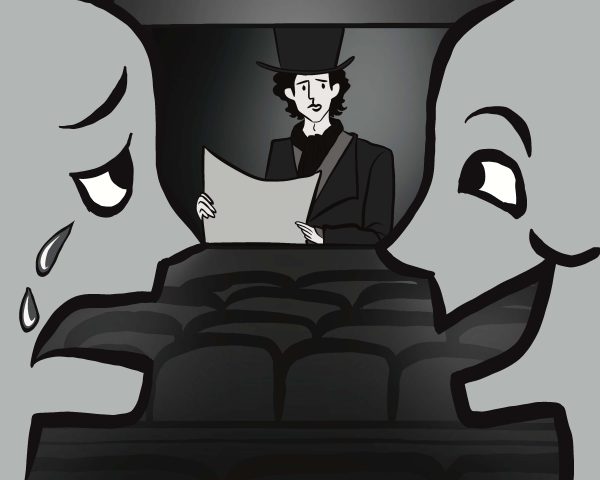
Jada Hauser | Washtenaw Voice
Lily Cole
Deputy Editor
Something my sister and I decided to try to do this year is see a new movie every month. When we go, we set our sights on the most outlandish media we can find, one such being the new “Wonka” movie that came out in December. I was excited to see Timothee Chalamet in another film. This one seemed fun and got him out of the serious pigeonhole he gets stuck in. Plus, I didn’t mind a Willy Wonka remake.
When the movie started, I was shocked that he was singing. It caught me completely off guard because when was “Wonka” ever marketed as a musical? When in any trailer had we seen Chalamet singing?
As a musical theater kid, I appreciated it. I got the movie’s gist and somewhat enjoyed it, specifically the three main villains whose song was by far the best in the whole film.
But then, it got me wondering what if I wasn’t a theater kid? What if I went into that movie without any knowledge of the stage? How would I feel then?
So, this is the question: what’s up with movie musicals nowadays?
Hope Bernard, a drama and film instructor, teaches about movie musicals in her introduction to film class. She talks about the transition from stage to film and its influence while explaining how we can’t see theater live because of time constraints.
“Movies give us the ability to experience things differently,” she said.
However, when we think about the marketing of movie musicals in 2024, it’s hard to say that they were ever musicals to the public in the first place.
In an interview with Variety, Paramount’s head of marketing, Marc Weinstock, said they were subtle with the new “Mean Girls” marketing.
The first the public ever saw of “Mean Girls” was the 2004 comedy written by Tina Fey. After its success, the 2018 musical debuted on Broadway, with the movie musical opening in theaters six years later.
Weinstock said that in trailers for “Wonka” and “The Color Purple,” the word musical wasn’t shown. The marketing for “Mean Girls” was the same; there was a music note in the title to give hints but make it less overbearing.
Why does marketing for musicals have to be so sneaky? It’s a niche topic that will bring its audience to the movie theater. To me, big corporations seem scared to market musicals to the public because of the loss of money.
The statistics show that the highest-grossing film of all time is “Avatar,” making just under $3 billion worldwide, according to the Internet Movie Database (IMDb). For musicals, “The Lion King” tops the list with roughly $1.6 billion, as reported by Box Office Mojo.
That’s more than a billion-dollar difference.
Michael Naylor, a professor of performing arts at WCC, said business-driven people view musical theater professionals as entertainment–he feels objectified by the sentiment.
“I get an allergic reaction when someone says I’m an entertainer,” he said.
There’s a stigma that everything needs to be based on how much money people can make and that it makes the world go round. The saying, “money is the root of all evil,” is more realistic.
According to Naylor, the role musicians play in social issues is huge. There’s an obligation to make the world a better place. It’s something I’ve thought about a lot too.
One of my dad’s favorite shows is “Rent.” Debuting in 1996 and set during the AIDS epidemic, it challenged mainstream media and gave a voice to struggling artists, drag queens and those suffering from HIV/AIDS during that time.
The “Rent” movie was filmed like the Broadway show and had most of the Broadway cast.
When looking at a movie musical, this one hits the nail on the head. It incorporates a cast that knows what they’re doing, has time to understand their characters, and becomes them. This way, we can connect with the characters on screen.
Theater has a live audience perspective, and when we put that on the big screen plus market it the right way, we can reach an audience that wouldn’t be achievable by just being on Broadway.
That’s what theater is all about, and it should be marketed to audiences in a way that is honest to viewers. As a sub-genre, it has an audience that can come and support their favorite shows or new ones arriving on screen.
In Jeetendr Sehdev’s book, “The Kim Kardashian Principle,” he talks about how audiences yearn for authenticity. Just as diners prefer an open kitchen to witness culinary artistry, moviegoers want an honest portrayal of what a film is–no smoke and mirrors, just a genuinely shameless cinematic experience.
As for “Wonka,” I would’ve enjoyed the movie’s vibrant color, music and performance more if I knew what I was going into.

